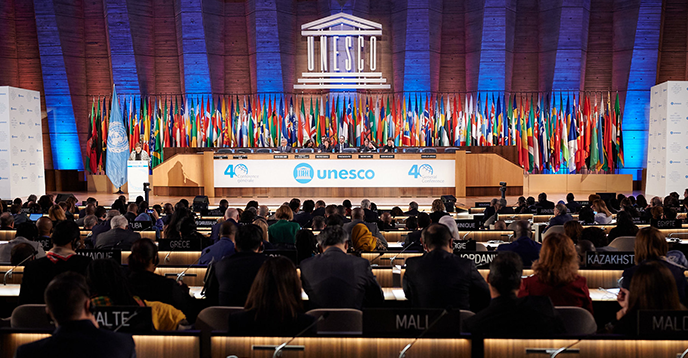
The 40th Session of the UNESCO General Conference continues in Paris. SUM Rector Ivan Lobanov is part of the Russian delegation
The 40th Session of the UNESCO General Conference continues in Paris. SUM Rector Ivan Lobanov is part of the Russian delegation
The Russian delegation is led by Mikhail Kotyukov, Minister of Science and Higher Education. The delegation includes the Rector of the State University of Management, Head of UNESCO Chair ‘Societal, Legal and Ethical Frameworking of Knowledge Societies’ and Vice Rector of the State University of Management, UNESCO Chair Executive Director Svetlana Malkarova.
For the first time in the history of UNESCO, more than 100 ministers and 100 university representatives gathered together to discuss some of the most pressing issues of higher education, including collaboration on an inclusive global campus to respond to the growing enrolment rates in higher education institutions and mechanisms to increase student mobility. They also identified ways to combat the growing inequalities in the global higher education sector.
The unprecedented increase in university enrolment rates in recent decades has been coupled with an increase in student mobility, leading to the gradual emergence of a global campus of students, teachers and researchers.
According to UNESCO, over the decade preceding 2011, the number of students enrolled outside their country of origin more than doubled and now stands at 4.3 million. This figure is estimated (conservatively) to double again by 2025.
During the UNESCO General Conference, Mikhail Kotyukov, Minister of Science and Higher Education of the Russian Federation stated that Russian universities are among the most popular for foreign students.
According to the 2019 report of the Organisation for Economic Cooperation and Development, Russia is one of the most attractive countries for foreign students, being second only to the group of English-speaking countries and sharing its position with Germany and France,
the Minister reported.
Our goal for the next five years is to double the number of foreign students in our universities. For this purpose, we have developed a dedicated project that combines measures to promote education and research activities as well as university infrastructure and information systems.
However, many students still experience difficulties with the recognition of their qualifications when returning home or moving to a new country. The non-recognition of qualifications is a major barrier to further training or finding a job.
Iselin Nybø, Norway’s Minister of Science and Higher Education,
Student mobility should become the rule, not the exception. We should make it our duty to facilitate cross-border recognition of qualifications.
More than half of all international students today study not only outside their home country but in a different continent or region.
Fernando Reimers, Professor of the Practice in International Education at Harvard University (USA) and a member of the UNESCO Commission on the Futures of Education,
In many cases, tackling the inclusion issue will require increasing access to higher education.
Jernej Pikalo, Slovenia’s Minister of Education, Science and Sport, highlighted the importance of elaborating common priorities with a view to promoting sustainable development of education and meeting the goals of the UNESCO mission in this time of change,
We are living in an era of fundamental transformations, and I mean all kinds of processes beyond the digital revolution. We are committed to strengthening multilateral cooperation. We need to identify priorities linked to the UNESCO goals. UNESCO is the conscience of the United Nations. We must not forget about sustainable development goals. These can only be accomplished through joint efforts.
To meet these new challenges, UNESCO is working toward the adoption of the Global Convention on the Recognition of Qualifications concerning Higher Education during the General Conference, which will end on 27 November. The new Convention aims to facilitate student mobility and improve access to higher education across regions and continents.
The Global Convention on the Recognition of Qualifications concerning Higher Education will serve as clear evidence that, despite all the criticism, multilateralism is the most relevant system in the modern interconnected world,
declared Audrey Azoulay, Director-General of UNESCO
Подпишись на тг-канал "Наш ГУУ" Дата публикации: 15.11.2019
Дата публикации: 15.11.2019


